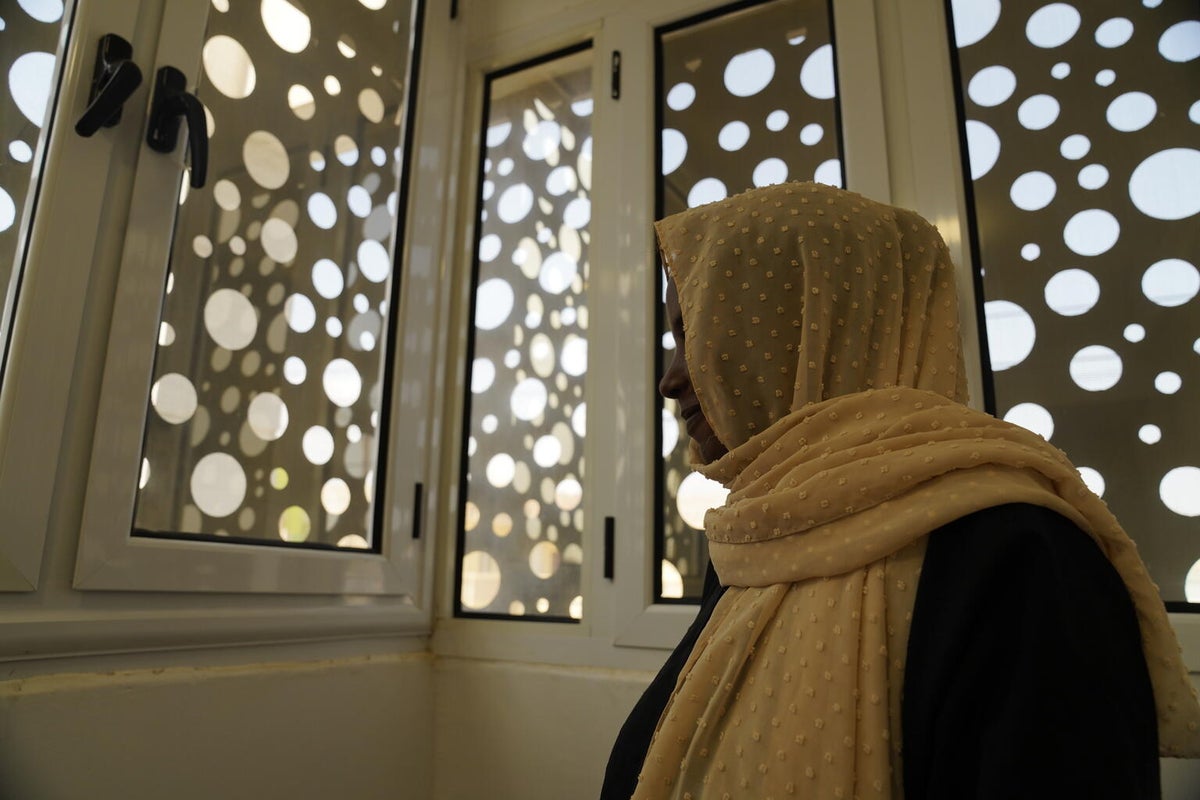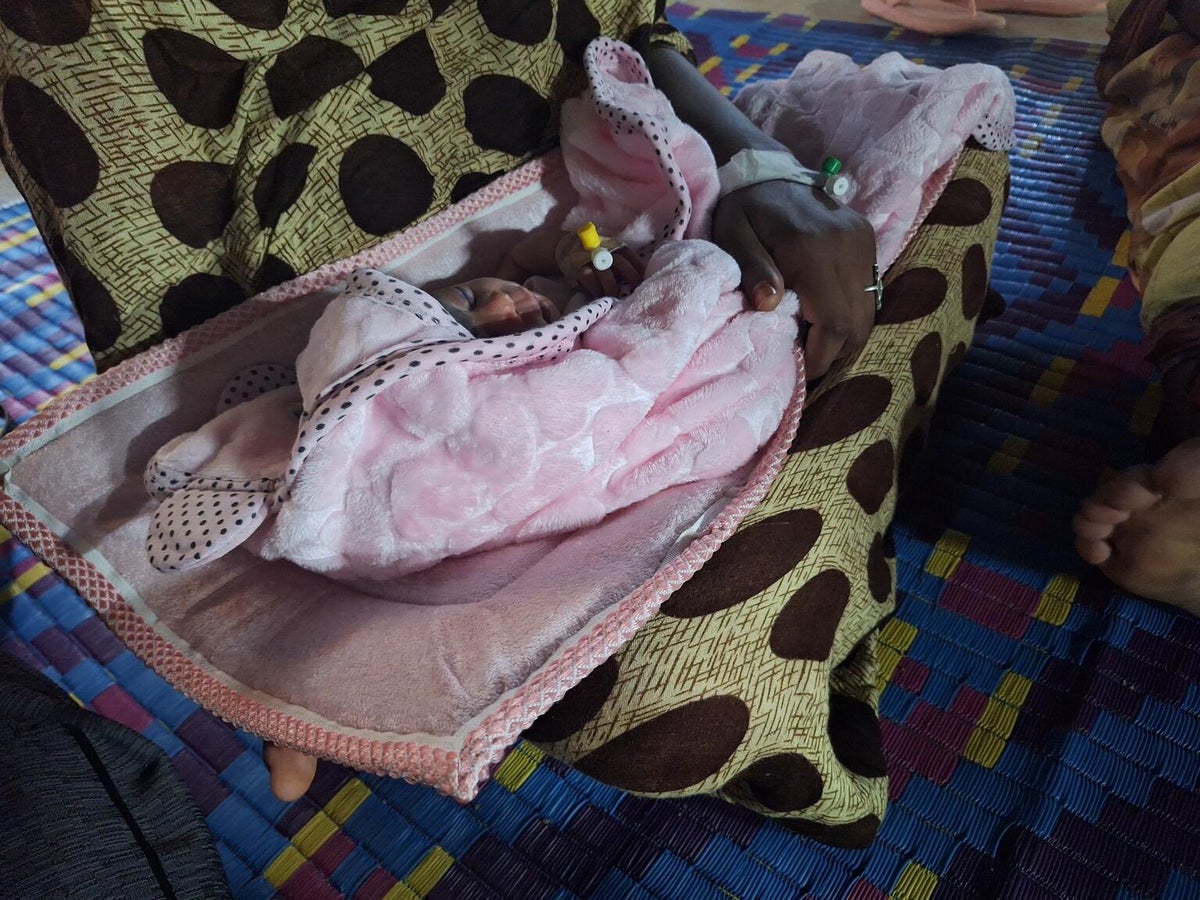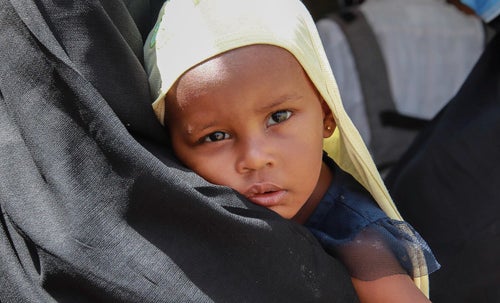Trigger warning: This story contains information and descriptions related to violence against women and children, including sexual violence, self-harm and suicide.
* Indicates a person’s name has been changed to protect their identity.
The devastating experiences of these women and children is one we should never have to report on, and one that impacts our teams deeply. While not easy to write or read about, the reality of what these children and women are going through deserves a platform so we can listen to their voices and support them as they recover and heal.
Forever scared by the unrelenting conflict that rages on around her, 16-year-old Dana* lives with the haunting memories of the four months she and her 19-year-old sister, Yara*, spent in captivity, enduring extreme sexual violence. After the sisters escaped, their family fled to another city where their mother desperately tries to protect them and their newborn babies.
Dana and Yara’s stories are not rare. It’s the brutal reality millions of Sudanese children and women face.
Nearly two years into the conflict, a devastating humanitarian crisis is unfolding, marked by violence, trauma, displacement and devastation. Millions have been forced to flee their homes, many into neighbouring countries such as Chad, Ethiopia and Egypt, making Sudan the biggest child displacement crisis in the world. The conflict is also pushing the country towards famine and a catastrophic loss of life, which has grabbed the media’s attention. Yet, global headlines have often overlooked the severe protection crisis, especially the widespread acts of sexual violence against children and women as a tactic of war.

Young girls and women speak up
Gender-based violence as a tactic of war
In many conflict settings around the world, including Sudan, sexual violence has often been used as a weapon of war.
Young Sudanese children and women who have reported their experience to UNICEF and local organisations describe various forms of attacks, such as armed men storming homes and demanding at gunpoint that families surrender their girls, often while violently attacking family members or raping the girls in front of their loved ones.
Armed men reportedly threaten and violate children as they flee their homes for safety. Girls have reported being repeatedly raped, often by several armed men one after another, especially after being abducted and held in houses. Girls, especially those who became pregnant due to sexual violence, spoke about being rejected by their families and communities due to social stigma. There are no words for this kind of harm and violence against children.
In less than two years since the conflict escalated, the number of people at risk of gender-based violence (GBV) has more than tripled to an estimated 12.1 million people, or 25 per cent of the population. According to UN Women, the number of survivors, some as young as one years old, seeking GBV services almost tripled in the year leading up to December 2024.
As this crisis continues to unfold, more and more survivors are refusing to stay silent, even in the face of social stigma. UNICEF will always stand with children and survivors.
Reem breaks her silence

At just 13 years old, Reem’s* childhood was shattered when she was assaulted by armed men. After she was assualted, her foster mother discovered Reem was pregnant and, in an effort to protect her, she arranged for Reem to marry an older man.
Since her marriage, Reem has been repeatedly raped and abused by her husband. Due to the lack of acceptance from the husband's family, her child has been taken away. Reem initially stopped speaking and suffered from repeated panic attacks and trauma-related convulsions.
"What happened to me was horrible. They did a horrible thing to me. They beat me. They forcibly took off my clothes. All my clothes. That’s what happened. For two days…. And my husband was also doing the same thing. Something bad."
With mental health and psychosocial support from a local organisation, Reem is now trying to reunite with her daughter and resume her education.
Stigma forces young girls and women to make heartbreaking choices

In Sudan, as in many countries, young children and women – the survivors, not the perpetrators – are the ones who carry the cultural blame for sexual violence. They face immense stigma, shame and ostracisation.
Survivors have spoken about being disowned by their husbands or fathers, while unmarried women and teen girls fear they will never be able to marry or return to their family homes due to social stigma. Some survivors have hidden their pregnancies from their families and left their communities. Several girls spoke about wishing they had been killed instead of being raped because of the heavy burden of shame they carry, with some, like Dana, who we met earlier, even attempting suicide.
The social isolation experienced by women and girls who become pregnant due to rape can have long-term consequences for their wellbeing and their children, including employment opportunities, acceptance by family and community, and the child’s access to services.
In some cases, babies are placed into foster care, given up for adoption, or abandoned. One centre that provides temporary care for infants until foster families are arranged reported a record 77 children in their care in 2024, largely due to children being born out of sexual violence.
In the face of social isolation, young girls become mothers

At 19 years old, Hala* holds her eight-month-old son while visiting a women-supported organisation where she receives psychosocial and financial support. Hala shares her story of being assaulted at 17 by armed men.
“I found a woman I knew there. I told her that I wanted to leave, that I couldn’t stay there, and that I couldn’t bear it anymore. I left with her,” explains Hala.
"At that time, I didn’t realise I was pregnant until I was already four months along. I explained to the woman what had happened, but she couldn’t accept the situation. She became scared and forced me to leave."
Hala continues, “After that, I became homeless, moving from one house to another and from one area to the next. I don't have a home or family. I tried to seek refuge in a shelter, but they turned me away because I was pregnant and refused to accept me.”
Having been adopted herself, Hala is determined to raise her son on her own, but it is very difficult. In the new city where she has sought refuge, Hala continues to face stigma, discrimination, and rejection. She wants to complete her education but can’t afford it or find someone to care for her baby.
“He is a quiet boy, he loves games and TV, and he likes me to play with him. And he loves animals.”

Three days after her daughter was born, 19-year-old Yara* sits in a hospital courtyard, cradling her beautiful newborn and wondering what the future holds for them. Yara was kidnapped alongside her 16-year-old sister Dana, who we met earlier.
Yara and Dana fled with their family, seeking refuge in a new city, but the two girls continue to face serious health and mental health consequences from their four months in captivity. Although their mother stands by them, they are starting their life as young mothers without the support of their extended family due to the stigma associated with having a child from rape.
"What happened is not her fault, so I have no reason to feel angry or resentful toward her (the baby). I didn't plan for my baby's future, how I would educate her, or whether she would be able to go to school. I'm not sure if I'll be able to obtain a birth certificate for my baby girl. I hope no girl in Sudan will have to endure what I went through."
Yara and Dana are receiving financial and psychosocial support, as they begin their journey as young mothers.
How UNICEF is helping young children and women recover from gender-based violence

Even after enduring the horrors of sexual violence, the challenges don’t end for many survivors in Sudan. Reporting violations and accessing support for sexual and gender-based violence remains difficult due to the accessibility, availability and capacity of services, damage to service infrastructure from the conflict, social stigma, fear of confidentiality breaches, fear of retribution, lack of electricity and connectivity, and insufficient humanitarian access to all parts of Sudan.
As a result, many survivors are left with little or no medical and psychosocial support in the aftermath of such pain and brutality.
Despite incredibly challenging circumstances and scarce resources, Sudanese women show immense solidarity, resilience and innovation to protect and provide for themselves, their families, and their communities. Sudanese women-led organisations have undertaken a heroic effort to support survivors with supplies and services and have achieved important reforms since the onset of the conflict to help survivors safely access services.
UNICEF is working with local partners in Sudan to reduce the risks of GBV, address underlying drivers and social norms, and support survivors – especially children - to access lifesaving medical, mental health, safety and referral services.
No child should suffer in silence. Children in Sudan need protection now.
If you find any of the information in this story distressing, please seek help from a trusted friend, family member, or mental health professional.

Children in Emergencies
UNICEF is providing urgent assistance to children. But we can’t do it alone. We need your help today.
Related articles
Stay up-to-date on UNICEF's work in Australia and around the world
















